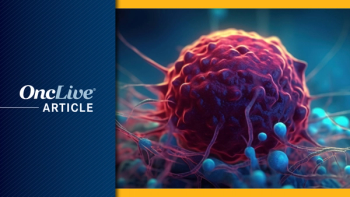
ASCO Endorses Molecular Testing Guideline for Lung Cancer
ASCO has endorsed the CAP/IASLC/AMP guideline on molecular testing for patients with lung cancer, which recommends EGFR and ALK testing for all patients with lung adenocarcinoma or mixed histology with an adenocarcinoma component.
Natasha Leighl, MD, MMSc
ASCO has endorsed the CAP/IASLC/AMP guideline on molecular testing for patients with lung cancer, which recommends EGFR and ALK testing for all patients with lung adenocarcinoma or mixed histology with an adenocarcinoma component.
According to the guideline, testing should be offered at the time of diagnosis for patients with advanced disease or recurrence regardless of tumor size or patient characteristics, such as gender, race, and smoking status. While the guideline did not identify a specific testing platform, it did advise against assays that utilized immunohistochemistry (IHC) for EGFR, EGFR copy number analysis, and ALK real-time polymerase chain reaction. In addition to alterations in ALK and EGFR, rearrangements in ROS1 and RET have emerged and potential markers for testing, the ASCO review panel noted.
"This guideline is incredibly important, as it increases the ability to personalize lung cancer care and improve outcomes for patients with advanced lung cancer," co-chair of ASCO's Expert Panel that endorsed the guideline Natasha B. Leighl, MD, MMSc, from Princess Margaret Hospital, said in a statement. "It describes the current evidence and helps oncologists and pathologists understand and put molecular testing into clinical practice."
The guideline recommends that laboratories should set a minimal cellularity requirement during assay validation for EGFR testing. The exact method chosen should be able to detect EGFR mutations in samples with >10% tumor cells. For the detection of the acquired resistance mutation EGFR T790M, testing should be adequately sensitive in samples with >5% tumor cells. IHC-based assays for the detection of EGFR are not recommended, except for samples that are insufficient for molecular analysis.
The FDA has approved an ALK-specific FISH assay as a prerequisite for treatment with ALK inhibitors for patients with non-small cell lung cancer. However, emerging evidence suggests that IHC could effectively indicated ALK-positivity. The ASCO panel suggested that IHC assays using the antibodies D5F3 and 5A4 could be utilized prior to FISH testing for the detection of ALK. In this scenario, if tumor samples test negative by IHC, FISH testing can be omitted. Positive tests should be confirmed using FISH.
KRAS mutation testing for the purpose of determining eligibility for an EGFR-targeted therapy was not recommended. However, since alterations in EGFR and ALK are not found in patients with KRAS mutations, the guideline states that KRAS testing could be utilized to exclude samples from requiring EGFR and ALK testing. In general, KRAS is present in 30% of patients, suggesting this approach could enhance the efficiency of testing.
"This guideline will help standardize which patients are tested and when and how the testing is implemented," co-chair of ASCO's Expert Panel that endorsed the guideline Natasha Rekhtman, MD, PhD, from Memorial Sloan Kettering Cancer Center, said in a statement. "We hope that it will encourage testing and treatment based on molecular results."
The guideline update suggests that implementation of the testing guidelines could vary based on individual testing algorithms at each local laboratory. The only stipulation placed on the operationalization for each lab was that test results should be made available within 5 to 10 workdays, with transportation times of 3 days for external facilities and 24 hours for institution-based labs.
Detailed information on the recommendations was published in an ASCO Special Article in the Journal of Clinical Oncology. Additional information and resources are available, at



































